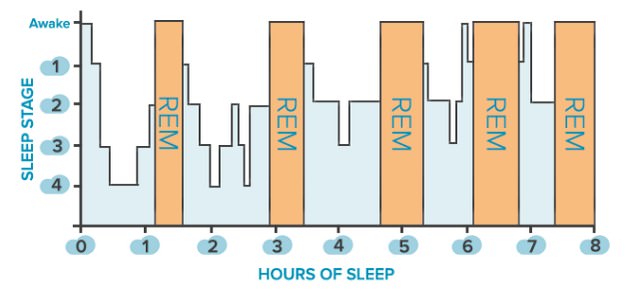How To Remember Your Dreams

Do you remember your dreams?
To lucid dream, I recommend being able to remember at least onevivid dream per night. That will boost your self awareness in dreams (making lucidity more likely) and also means you can actually remember your lucid dreams. Which is nice.
Here are four detailed tips on how to remember your dreams more frequently. And if you don't think you dream at all - trust me, you almost certainly do. It takes an extraordinarily rare sleep disorder to deprive someone of dream sleep.
Here's how to remember more of your 100-minutes of nightly dream time.
Step 1. Sleep Well
It sounds obvious, but it's important.
During the first 4-6 hours of sleep each night, while you do dream in short bursts, your brain prioritizes NREM (deep sleep) so your body can physically rest and repair itself.
After that, you enter longer and longer periods of REM (dream sleep). This is when your mind can offload emotions and perform psychological healing. This phase holds the greatest potential for lucid dreams.
So, if you're sleep deprived on a routine basis, you're going to experience fewer dreams overall. This is bad for your mental health, and it's bad for your ability to lucid dream.
(When you do catch up on sleep after a lengthy period of deprivation, you enter a state called REM-rebound. You go into a frenzy of REM sleep to catch up, which underpins the importance to healthy brain function.)
Now, when do dreams actually occur throughout the night? Take a look at this chart:

There are five sleep cycles showing here, over a period of eight hours.
Each cycle starts in stage 1 sleep, dives down into the depths of stages 2, 3 and 4 of deep sleep, then rises back up into REM sleep. When REM sleep ends, the cycle is complete. It lasts all of 90-110 minutes in adults.
Although we enter periods of REM sleep throughout the night, we rarely remember the dreams from the first few stages of REM. That's because they're shorter - plus, we're so tired that we tend to dive right into the next sleep cycle without waking up.
And it's only when we wake up that we recall our most recent dreams.
As the morning comes, you need less and less deep sleep, and you spend more and more time in REM sleep. If you typically sleep 6-8 hours per night, you'll know how satisfying it is to sleep-in at the weekend and enjoy a 12-hour stretch of sleep. That creates a lot of REM.
Most of my lucid dreams occur from 6am onwards, and many of my longest and best lucid dreams occur during weekend lie-ins beyond 8am.
So, take the sleep your brain and body need. And allow yourself to sleep-in at weekends if you can.
Step 2. Keep a Dream Journal
 Now you're getting loads of REM sleep, it's time to actively keep a
record of your dreams every day. The best way is to keep a written
and illustrated
dream journal.
I've accumulated a ton of these over the years.
Now you're getting loads of REM sleep, it's time to actively keep a
record of your dreams every day. The best way is to keep a written
and illustrated
dream journal.
I've accumulated a ton of these over the years.
All you need to do is spend 10 minutes writing down your dreams in the morning before you even get out of bed. Have a notebook by your bedside and on waking, immediately write down as many details as you can remember. When dream journaling, write in the present tense and underline unusual characters, symbols, scenes, plots, themes, or emotions.
If nothing comes to mind, it's likely you weren't dreaming. Just relax and lie quietly for a few minutes and think about what you'd like to dream about next time. (This is lucid dream incubation!)
A Dream Recall Experiment
If you want to take this technique to the highest level (and this involves real commitment, at least for one night) you can try this dream recall experiment. It involves waking yourself at the end of your sleep cycles to coincide with your REM sleep.
Why the hell would anyone do this? Studies show we remember dreams much more vividly when we awaken directly from the dream. If we go straight from REM sleep back to NREM sleep without waking, the dream is often lost forever.
So here's what you do. The free (albeit slightly random) method is to set your smartphone to wake you after roughly 4.5 hours of sleep. With luck, this will wake you during the first chunky phase of REM sleep and you'll have immediate dream recall. Write down whatever you can remember.
Then have your alarm to go off every 90 minutes for the rest of the night. You should extend it if you know it takes you a long time to get back to sleep (although if that's the case I wouldn't recommend this method for you, as it may cause excessive sleep deprivation.)
 The more accurate way to perform this technique is to use a sleep
tracker like the
Fitbit Flex Wireless Activity & Sleep Wristband. You can trace your personal sleep profile and wake yourself with
a silent (vibrating) alarm during REM sleep. This is for hardcore
sleep and dream enthusiasts.
The more accurate way to perform this technique is to use a sleep
tracker like the
Fitbit Flex Wireless Activity & Sleep Wristband. You can trace your personal sleep profile and wake yourself with
a silent (vibrating) alarm during REM sleep. This is for hardcore
sleep and dream enthusiasts.
Either way, by the time morning comes, your goal is to have recalled four or five detailed dreams in your journal. The first time I tried this, I was blown away. I had no idea I was experiencing so many long and vivid dreams every night.
Note: This is a really cool experiment and well worth trying out yourself at the weekend - but only do it a couple of times so you don't burn yourself out. It's really a demonstration of your dream recall potential.
Step 3. Try a Supplement
If you’re really excited about remembering your dreams, try a supplement.

Oneirogens are substances that invoke a dream-like states of consciousness. Some have been scientifically proven, while others have been established through thousands of years of cultural use.
For example, Calea Z is a cool dream enhancing supplement. And because of the intensity of the dream, you're far more likely to remember it and perhaps become lucid.
Make use of the Wake Induced Lucid Dream technique alongside the supplement to maximise your chances.
If you're against using supplements, there are certain foods known to increase the intensity of your dreams. These include cheese, chicken, salmon, lamb, eggs, white rice, flour, and milk. These all contain Tryptophan, low levels of which are linked with poor dream recall.
Final Thoughts
Now you can see that remembering your dreams is essential if you want to have lucid dreams.
Life is not always straightforward, though, so don't worry if you drop the ball and pull an all-nighter. Or if you forget to keep a dream journal for a few weeks. There will be ups and downs in your lucid dream life.
















